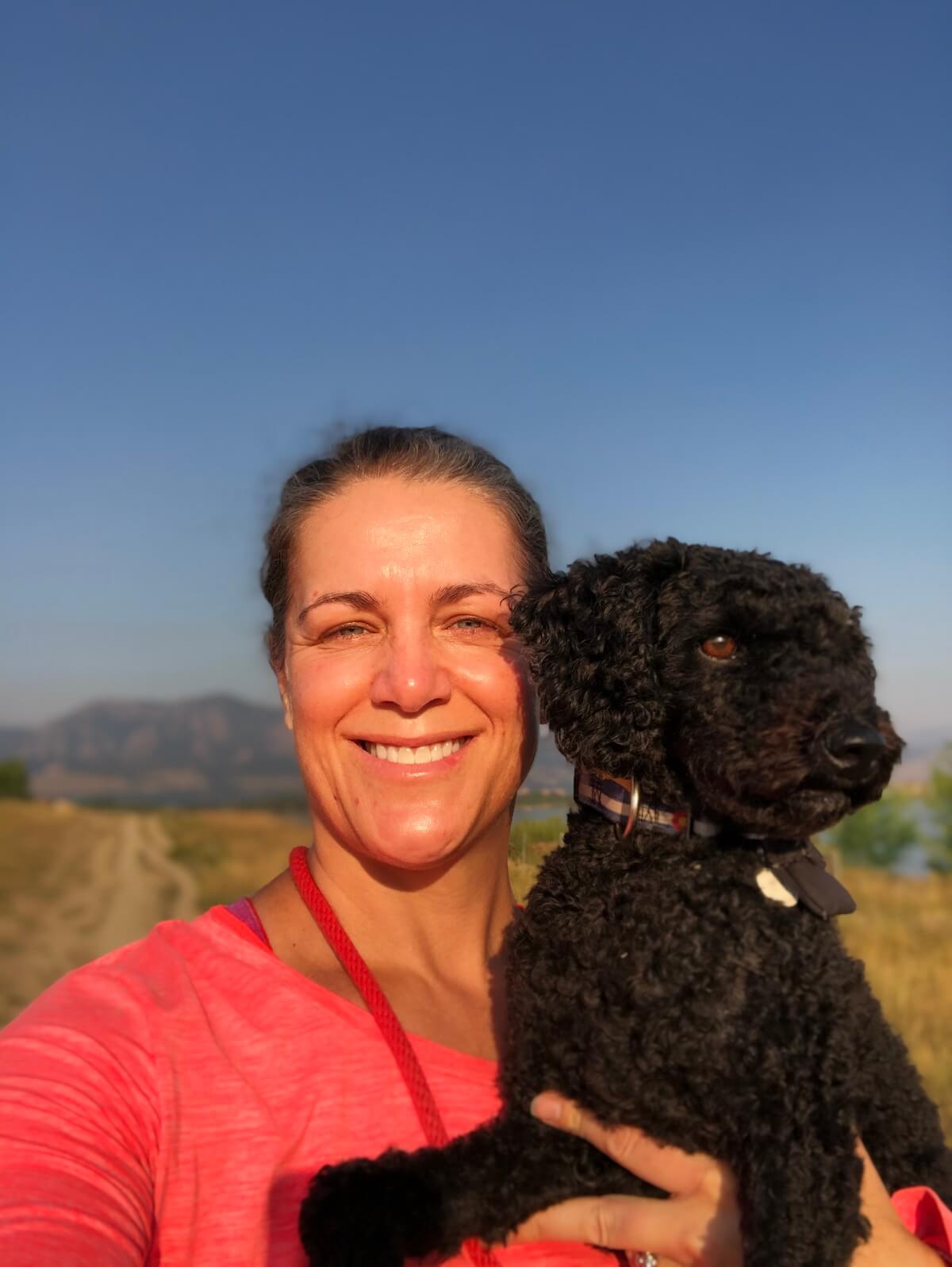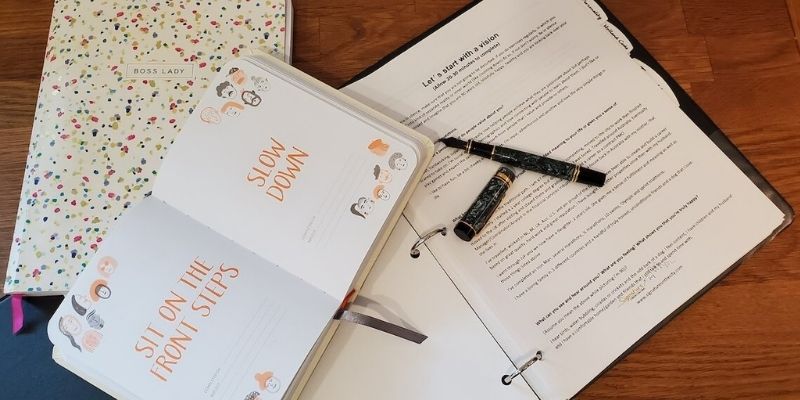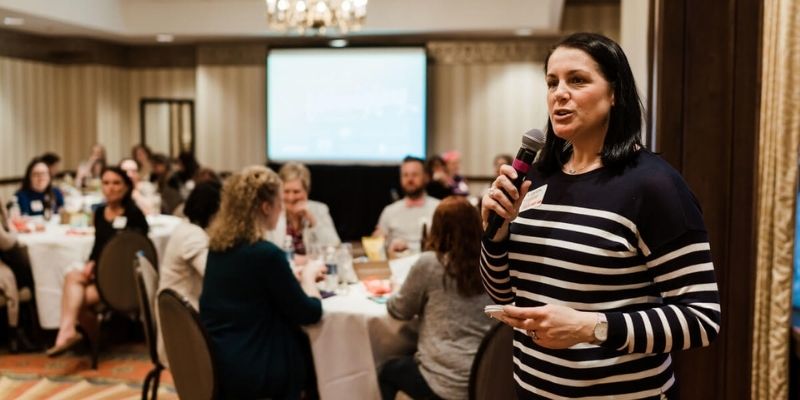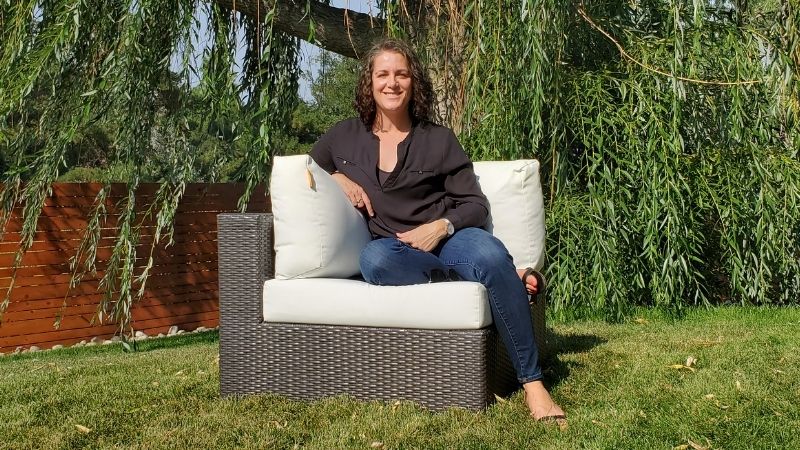How an Ops Director Discovered Her Core Values and Banished Burnout
Sarah Dunbar had just dropped off her three-year-old daughter at daycare and was heading to the office when a familiar feeling began to creep in. The Monday dread.
As Operations Director at an accounting firm in Colorado, her days are busy, and thinking about the week ahead was starting to make her stomach sink. She rolled to a stop at the intersection, mentally grappling with her demanding to-do list. As the light turned green, an internal switch also flipped.
“I’m driving to a job that’s the perfect role for me. I like the people I work with. My dog’s in the passenger’s seat. And I’m wearing shorts. What’s the problem?”
For Sarah, that panic was a relic of the past, a “learned pattern of reaction” she developed from working for over a decade within environments and mindsets that she would come to discover did not always align with her core values.
Now, she no longer has to shore up all of her inner strength just to get through the day. Her work doesn’t drain her of her creativity — it feeds her curiosity. And, her role suits her desire for both autonomy and connection to the company’s mission, leaving her plenty of energy to enjoy her time with her husband and toddler.
Considering how many of us wrestle with the “Sunday Scaries,” Sarah’s current situation sounds lucky. But finding career satisfaction had nothing to do with luck. It was the product of a very intentional journey, driven by self-assessment, personal discovery, research, and strategic decision-making.
While some administrative and operations professionals will admit they “fell into” their roles, Sarah’s career choice was strategic.
“I was interested in learning about other people and I really wanted to live and travel around the world, so I knew I would need to have transferable skills,” says Sarah. “I chose this profession because it seemed like a career that I could do anywhere.”
A native Australian, Sarah grew up as an artsy, athletic kid with a thirst for adventure. While other kids were mostly fangirling over boy bands and soap stars, Sarah was swimming, surfing, and “beating about with [her] cool Grandma and parents” in their cozy beach town.
With curiosity as her guiding light, she tried her hand at lots of different things and tended to bore easily. Though, any time she really got a feel for something — she’d double down, challenging herself to excel.
While this kind of curiosity-led exploration may sound like an ideal learning experience — the kind touted by successful entrepreneurs and brilliant startup CEOs — it ran counter to what she was being fed in school: that success required a defined career path with clear direction; one that she should start mapping out ASAP.
“I was never the kind to fixate on what I wanted to be when I grew up. I was more interested in exploring and testing myself on whatever piqued my curiosity,” she reveals. For a long time, I thought of myself as less than because of it. Now I realize it’s one of my strengths.”
Over the span of her career, Sarah’s curiosity and wanderlust has landed her in operations, project management, and executive administration roles that took her to Brussels, Amsterdam, London, and the United States.
As she explored new countries, she also climbed the ranks, racking up 15+ years of experience in financial services, banking, and corporate insurance. A sometimes slippery world, where one can find themselves sucked into the competitive vortex of titles, salaries, and prestige.
“I’d been chasing that a lot,” she admits while reflecting on the past. “Which I think many people tend to do, especially when they first enter their career. It’s like you’ve got to move forward, you’ve got to keep up. And that’s compounded by the pressure of everybody else around you.”
Problem is, when you’re pushing yourself so hard for so long in a high-stakes environment, it’s easy to miss tell-tale signs of burnout. For Sarah, it started slowly at first; a fluttering thought in the back of her mind. But as time marched on, the days became heavy. She could feel herself growing increasingly anxious.
Never one to shy away from a challenge, her company’s high expectations and low tolerance for mistakes suddenly had Sarah uncharacteristically always on edge. She began replaying each finished task in her head, worrying whether she’d chosen the correct approach, wondering if she could have done it better, differently.
Typically proactive, she became reactive. Her natural curiosity dwindled. She started comparing herself to others and second-guessing her value in her workplace. And if there was a strategic next step for her within the organization — a fulfilling project or opportunity to flex her management muscles — she couldn’t see it.
“I knew the situation was pretty bad when I started browsing the job market on a near-daily basis,” she said.
Her husband Paul also noticed the shift in Sarah’s personality and helped her see that she didn’t need a new job — she needed a break. Soon after, she and her company amicably parted ways. And with her husband’s support, she decided to take some time to recover, and figure out what to do next.
We live in a world that makes it hard to really unwind. The demands of daily life are intense and never-ending, compounded by a culture that is constantly prodding us towards productivity.
We’re taught to equate success with achievement, and achievement with happiness. Meanwhile, the non-stop pressure to achieve, according to research, can become a serious barrier to the body’s ability to relax.

Sarah’s dog Digger made the perfect companion for long walks and quiet soul searching.
In the absence of an overwhelming work week, Sarah accidentally found a new stressor to put energy towards: the uncertain future of her career. Suffice to say, relaxation didn’t come easy for her at first.
“I watched some documentary that said that one of the best things to do when you’re feeling anxious and stressed is to put yourself in a natural outdoor environment where it’s unclear what timeframe you’re in. It could be 1920, or the 1600s, or 2021, but you can’t tell because you’re surrounded by nature.”
So, Sarah, a lover of the outdoors, started taking daily walks with her dog Digger, exploring some of the 155 miles of hiking trails in Boulder, where she lives.
She spent a lot more quality time with her daughter and husband, too. She made a point to read books and articles about topics that interested her, even if — especially if — they didn’t pertain to her career.
“I wanted to be intrigued and interested in a lot of things again. That side of my personality had fallen away.”
As former swim coach and personal trainer, she also explored some of the latest trends in health and fitness. She dabbled in an online course on data mining because she thought it sounded interesting (it wasn’t). And because she’d always been fascinated (and a little baffled) by human resources in the United States, she started pursuing a certification in HR administration.
As Sarah began to feel her well-being restored, her thoughts returned to her career. And, admittedly, they were all over the place: Should I look for another role like my last? Go for a promotion? Or do I want something more creative? Should I leave finance and explore another industry? Which of my skills do I actually enjoy? Am I meant for another profession entirely?
Even though early in, she found herself caught up with the desires of a lucrative salary, titles, and accolades, she’d suspected for a while that those career markers didn’t resonate with her anymore.
“I knew I wanted to better understand my motivation for working, apart from paying the bills, but I needed help cutting through my own BS to get to the basics.”
“I’d been talking to a friend who’d gone through something similar and she recommended trying a career/life coach.”
Sarah had never thought to hire one before. During a lengthy research process, she discovered there was no shortage of potential coaches who guaranteed to help her ascend the corporate ladder and make more money.
“I found out a lot of them are really sensationalists. They were like, ‘Yeah, it’s gonna be great! We’re gonna get you up the ladder! You’re going to be COO!’ But that just wasn’t where my head was at.”
Also, she didn’t need a cheerleader. She wanted to feel supported, of course, but she was primarily interested in working with a clear, honest communicator who approached their working relationship with structure and a proven process.
“I wanted someone who would just be real with me,” she says. “Someone unafraid to ask the difficult or uncomfortable questions. Someone who would really challenge me and keep me honest, was key.”
She ended up selecting Diana, a career and life coach local to her who personally identified with Sarah’s circumstances. As a senior-level HR professional, Diana herself had realized that she was no longer working with people one on one (her true passion) and made the switch to coaching individuals instead. Sarah and Diana agreed to meet for one hour every week for six weeks.
Sarah’s Key Questions for Choosing a Career Coach
- Does their experience and approach resonate with my goals?
- Have they made an effort to hear and understand my specific needs?
- Do they have a clear plan of what I can expect to achieve?
- How will I be supported throughout our engagement?
- Does their personality and communication style feel like a good fit?
- Do I actually like this person and respect their opinions?
Diana took Sarah through multiple personality and skill assessments to help pinpoint her optimal career paths and assigned her a workbook of exercises that would inform their weekly conversations. “The actual sessions were a bit like therapy.”
Diana asked probing questions, Sarah answered them. Diana pushed further, Sarah dug deeper. During one session as Sarah struggled to break through, Diana asked her simply: what are your values?
“What do you mean ‘my values?’”
Diana elaborated: “What do you care about most in the world?”
Sarah’s first answers came quick; her family and health were at the top of the list. But identification beyond that took more brain power — cutting to your true core values was harder than it seemed. After working through Diana’s exercises and much self-reflection, she finally determined that she valued knowledge, experience, personal growth, relationships, and environment above all else.
Sarah’s list of core values wasn’t entirely surprising to her. However, the realization that what she valued most hadn’t been prioritized in most of her career decisions — that was eye opening. Her job and her core values seemed to exist on two separate planes and, over the years, the distance between them had steadily widened.
To make a more fulfilling career move, Sarah needed to lead with her core values. For example, it didn’t make sense to consider a position that came with a lengthy commute, even if it was interesting and paid handsomely, as traveling would subtract from quality time with her family. She wanted to build on the knowledge she’d acquired over the years, which ruled out career changes that would require her to “start over” or go back to school. She realized she preferred to support teams versus an individual, to maximize her impact on the company and growth within her role. And for the sake of her mental and emotional health, she needed a more relaxed environment that fostered a culture of learning over perfection.
“I’d always thought of myself as a structured, stoic, corporate type,” she said. “But the journey of defining my core values helped me see that I was much more excited by the prospect of working with entrepreneurs, startups, and smaller firms.”
And while she raves about the process, she candidly reiterates: “it was very much a journey.”
“I was surprised how often I’d slip back into my previous ideas of success — money, title, status, number of people I was managing. Throughout the exercises, I was frequently reminding myself, that’s not me anymore. That’s the old me.”

Sarah’s career coach assigned her a workbook of exercises that would inform their weekly conversations.
From there, Diana gave her another assignment. She instructed her to search LinkedIn for roles in operations management — a field amenable to her interests, strengths, and years of experience — and print out relevant job descriptions.
“She had me circle the aspects in each of the job descriptions that I liked, and then measure them against my core values. Did they feed my values, or did they subtract from them?” Sarah explains.
Any task or responsibility that didn’t pass the core values test was stripped away, and the result was a model job description that she would use to evaluate opportunities on her new career quest.
Between homework assignments and sessions with Diana, Sarah continued to conduct her own research to better understand the job market and learn how her peers had plotted their own career journeys. “I identified people in my LinkedIn and OfficeNinjas® networks who were in a position or industry that I found interesting and wanted to explore. I also asked these people how they approached their careers and what mindful, proactive things they did to propagate their success. I asked them what a typical day was like for them and what they enjoyed about their roles.”
Hearing about others’ wins, their mistakes, and what they wished they’d done differently gave her the perspective she needed to start making her next career move.
Epiphanies aren’t always groundbreaking. Some big realizations are simple. Others, annoyingly obvious. What we do with them is what matters.
“I went into this whole self-discovery expecting to be faced with a massive realization. Like, my god, that’s it — I was meant to be a… nurse this whole time!”
Instead, Sarah found her perfect match in a small Boulder accounting firm as their Operations Director — a role that doesn’t seem all that different from her previous positions. At least on paper.

Sarah co hosts an OfficeNinjas Admingling event on March 26, 2019, in Denver, Colorado.
It makes sense, though. Sarah attributes her career growth in administrative and operational roles to a genuine interest in learning about other people and building meaningful relationships. Even if you’re an expert in your field, being able to relate to and connect with your team members is imperative. This is the part of being an administrative/operations professional she enjoys the most.
After making peace with the fact that, no, she would not be pivoting to an exciting new career in the life-saving business, she was content with the outcome.
“It was validating to realize, you know what, I’m not bad at what I do. I really like what I do! It gave me a lot more confidence that I bring into my new role.”
Sure, she’d worked in operations before; and, yes, she was more than familiar with the financial sector. But there are a few key differences — all of which tie back to her core values — that make this new role a better fit.
In previous organizations, she felt her work was siloed and rigidly defined — too much so for someone energized by learning via new experiences and challenges. “My new role gives me autonomy to identify opportunities for improvement and then implement those changes.”
Previously, she was often one of many hundreds of employees, where it was difficult for one person to affect growth. Now, she works within a small close-knit team. “I can be involved in every aspect of the company’s development and ongoing business. I’m not waiting for work to be delegated to me, although there are still directives from the CEO that require action,” she explains.
And while plenty of companies claim that they promote a culture of learning and make room for experimentation and mistakes, Sarah has found that her new company actually lives up to their promise. She notes one example in which her manager emailed her about an error she’d made and asked her to follow a certain process. Her instinct was to launch into explanation — a behavior associated with past cultures in an unforgiving industry.
“You constantly had to justify your actions or risk getting raked over the coals. So it was second nature for me to try to explain,” she says. “But my manager stopped me and was like, ‘Hey, it was a mistake. No need to explain. We can learn from it.’”
In general, Sarah says, the culture is results-driven, but more friendly and relaxed.
“This journey has made me challenge what I’d always thought of as ‘career success,’” she says. “The real epiphany was that I had to stop worrying what everybody else thought. Realizing that I didn’t actually care whether I was rising to the heights of greatness the way others thought you should.”
As our commitments grow and expand, our priorities inevitably shift. Early in Sarah’s career, travel was a big motivator. But now that she’s a mom, staying grounded in a great place means more. Perhaps one day, when her daughter is making her own way, Sarah and her husband will revisit that jetsetting life.
As life continues to evolve, the work of measuring career against core values must be an ongoing process. Sarah plans to revisit her core values every few years to reassess and, if necessary, make adjustments. She just wishes she would have started doing this sooner.
“I wish I had been more honest with myself earlier on. I think as administrative professionals, we often feel that it’s our obligation to really stick it out rather than analyze a situation to determine if it’s just not right for us,” she muses. “Change is pretty scary, but it’s also invigorating and exciting!”
Now that she knows what she truly values, Sarah has clarity and purpose that she didn’t have before. Now, with a greater understanding of her purpose, she is more ambitious than ever in her pursuit to fulfill her goals — and she’ll likely be doing it in shorts.
Leave a comment below and share your thoughts
Take a few minutes to share what Sarah’s story means to you. Here are some questions to get you started:
- What feelings did Sarah’s story bring up for you?
- What parts of her story stood out to you most and why?
- Which of the ideas discussed in her story would you like to learn more about?
And if you have a question for Sarah or your fellow Ninjas, include it in your comment too!
